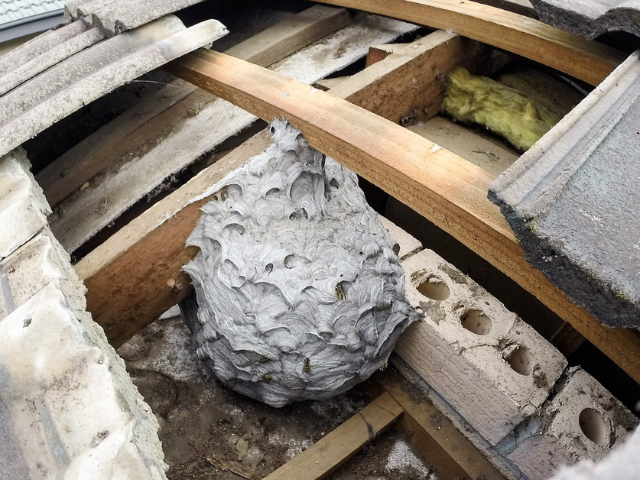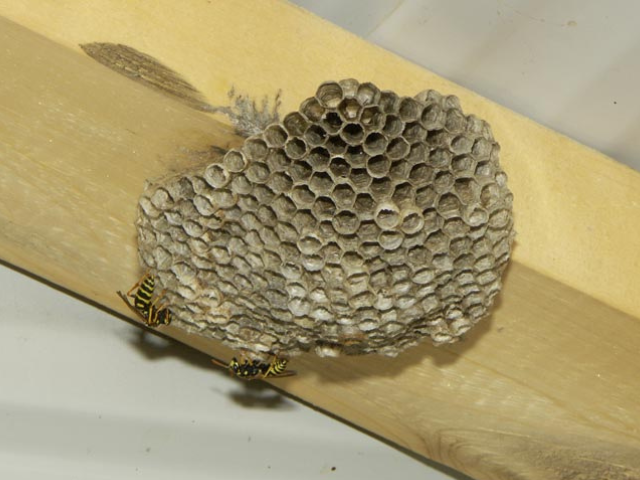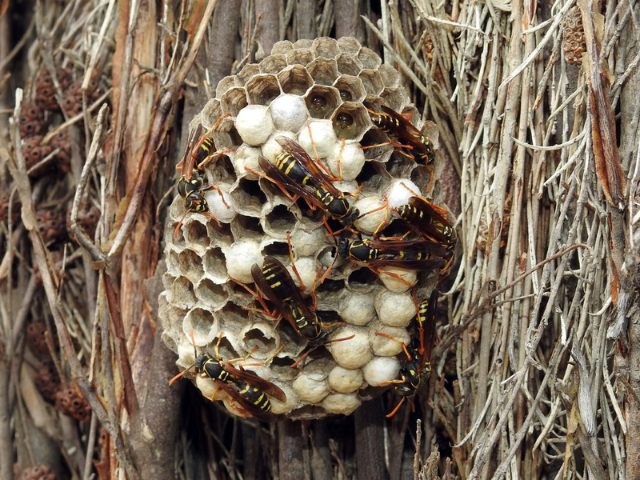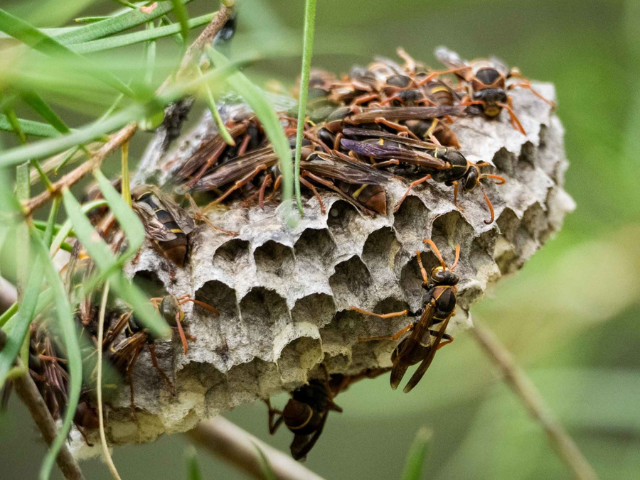European wasp
The European wasp, Vespula germanica (Hymenoptera: Vespidae) is not native to Australia but has become so widespread that it is now considered naturalised and no longer a notifiable pest in Victoria.
European wasp in Australia
The native range of the species is Europe, North Africa and temperate Asia but it has since spread to North America, South America, South Africa, New Zealand and Australia.
The first record of European wasp in Australia was when it was discovered in Tasmania in 1959, probably as a result of a stowed hibernating queen on a ship. By the late 1970s the wasp had reached southern mainland Australia and was found in Victoria, New South Wales, South Australia and Western Australia, while isolated nests were found in southern Queensland.
The European wasp was first sighted in Melbourne in 1977 and within 5 years it colonised much of the greater Melbourne area. It is a scavenging insect that prefers to coexist with humans to share our food and crops. By the 1990s, the European wasp was established throughout most other parts of Victoria.
Key features of European wasps
- Similar in size to a bee
- 12–16 mm in length (queens and males are larger at 17–20 mm long)
- Bright yellow body with black triangle-shaped markings (Figure 1)
- Yellow legs
- Two long black antennae
- Wings folded when at rest.
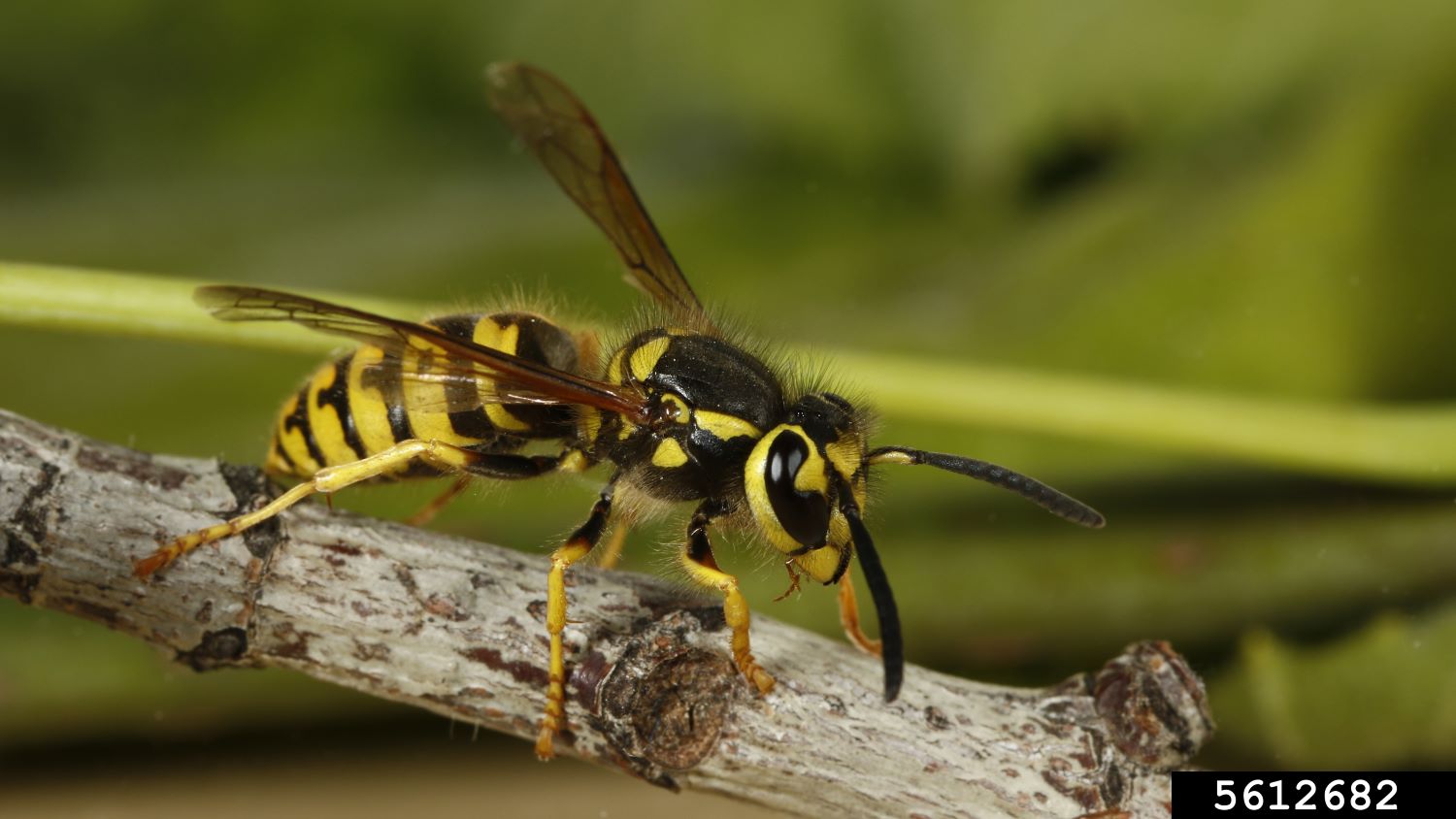
Nests
European wasps make their nests from chewed wood pulp and saliva, giving the nest walls a distinctive papery look.
About 80% of European wasp nests occur in holes in the ground or in areas close to the ground such as around the base of trees and along hedges, within retaining walls, in rockeries, underneath compost heaps or in and around disused hard rubbish.
Nests in the ground often resemble footballs. The remaining 20% of nests occur inside buildings (e.g. roof or wall cavity) or in sheltered areas around buildings (Figure 6).
In order for a wasp nest to be controlled the nest must first be located. The European wasp may forage for food up to half a kilometre away from its nest. European wasps can be tracked back to their nest by placing food (for example meat or pet food) in a visible outdoor location.
Once it has located the food source, the wasp will fly virtually in a straight line back to its nest. If necessary, keep relocating the food source until you can clearly see the path the wasp flies to its nest.
The nest grows in both size and number of wasps over summer and reaches a peak in early autumn. Male wasps (drones) are then produced, followed by new queens in late autumn.
The new queens and drones mate and the nests usually decline and finally die out during winter. However, the mild winters in southern Australia mean nests can survive over winter.
These overwintering nests may retain many new queens and, given the head start of not having to establish a new nest, can grow huge, containing tens of thousands of wasps.
Feeding behaviour
European wasps are opportunistic scavengers and hunters and able to take food from a variety of different sources. They have been known to eat carrion, insects, spiders, fruit, human food and garbage.
Impacts
European wasps are attracted to foodstuffs and drinks and can interfere with outdoor eating and living. Unlike a honeybee, the European wasp can sting repeatedly, especially if its nest is disturbed. European wasps can also be a problem for fruit growers, beekeepers and food processors.
Information on the symptoms and treatment of European wasp stings, including allergic reactions, is available at Better Health.
Pets or domestic animals stung by wasps may become agitated. If the site of the sting is known, keep the animal as quiet as possible and apply first aid, as for humans. If the animal is distressed, seek veterinary treatment as soon as possible.
Other wasps easily confused with European wasps
European wasps can be easily mistaken for honeybees (Figure 2) and other species of wasps (Figures 3, 4 and 5).
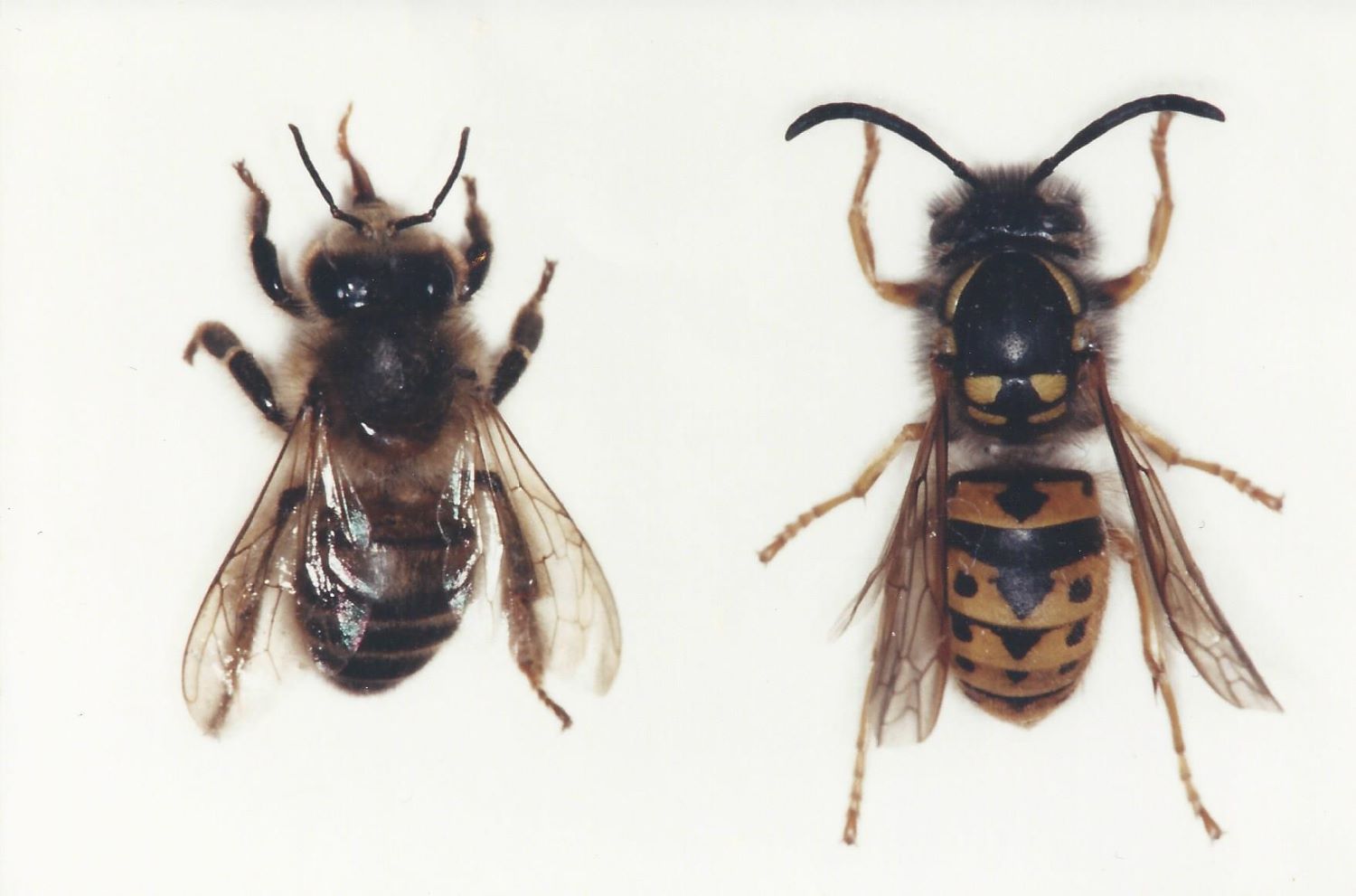
European paper wasp – Polistes dominula
The European paper wasp, sometimes called yellow paper wasp (Figure 3), is an introduced species to Australia. It was first discovered in 1986 and is now found throughout southern Australia.
The nest is a characteristic upside-down umbrella shape where the open cells can be seen from below (Figure 7). Nests are constructed in protected locations such as under eaves and in attics and wall voids and have been found in unlikely locations such as outdoor barbeques, cars, boats and motor homes.
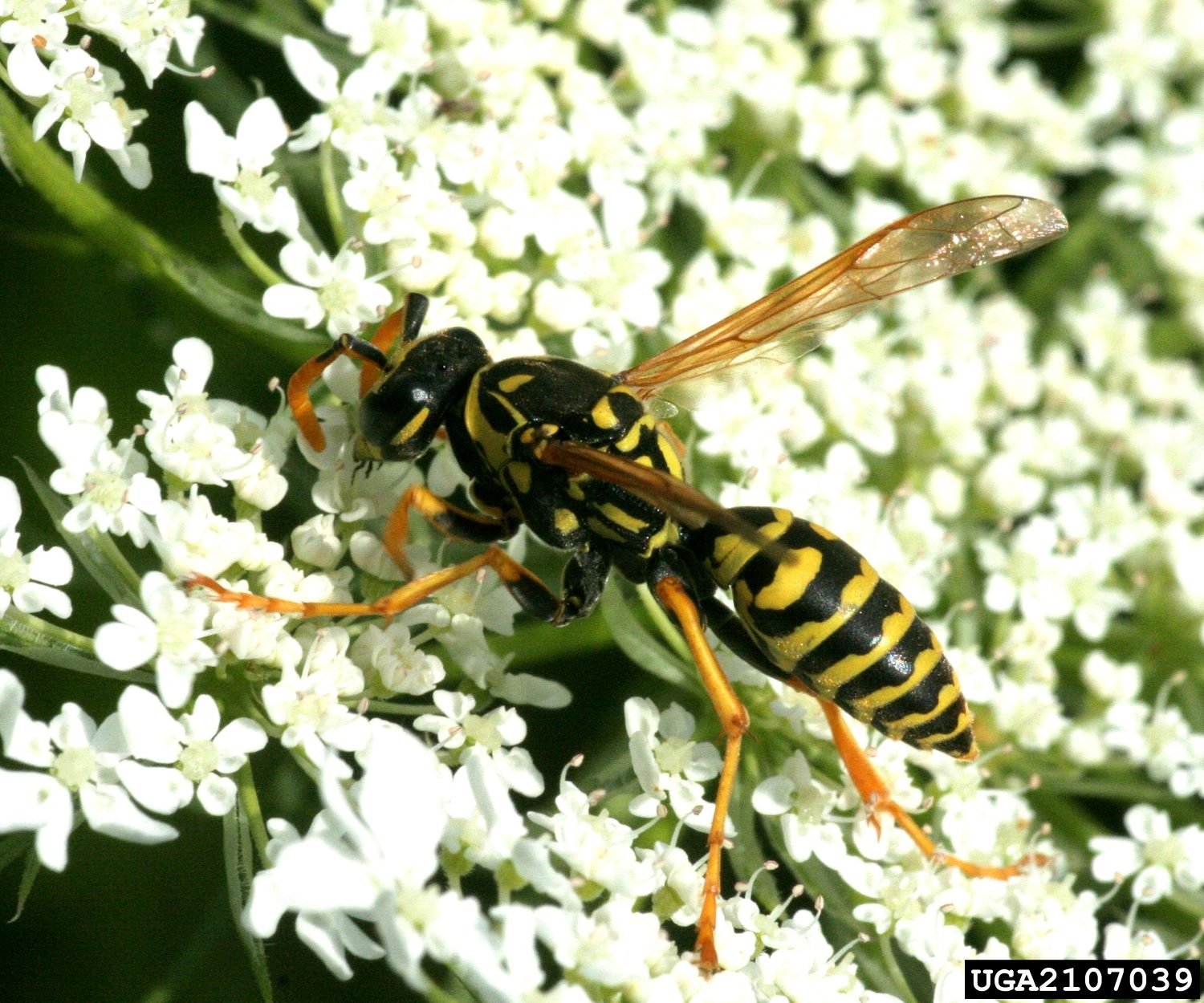
European paper wasps do not typically sting unless threatened. Unfortunately, attacks are common in urban settings where an unsuspecting homeowner finds themselves close to a nest they were previously unaware of.
Asian paper wasp – Polistes chinensis
The Asian paper wasp (Figure 4) was found in Australia in NSW about 10 years ago and in Victoria 5 years ago. During autumn the females will be mating so there will be lots of activity. Females then hibernate for the winter and emerge in spring.
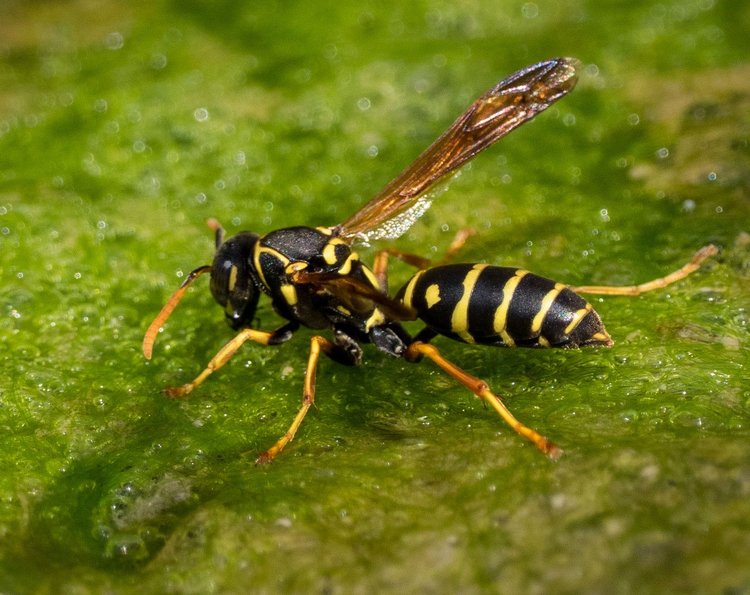
The adults’ preferred food is honeydew and nectar, thereby competing with honeybees and native birds. The larvae eat invertebrates – caterpillars and spiders – that the adults catch for them and place into the nest as a ready food source for when the larvae hatch.
The wasps are active during the day and sleep on and around the nest at night. The best time to treat is late in the evening when the wasps are in their nest and their activity is low. Unlike European wasps, which mainly nest in the ground, Asian paper wasps nest in the open – in trees, under house eaves and on fence posts (Figure 8).
Much like the native wasps, the nest looks like an upside down umbrella and reach a maximum size of 10–12 cm. If treating, make sure you can identify the pest from the native species. Native wasps tend to be brown with yellow patterning in colour while the Asian paper wasps are black with prominent yellow stripes.
Asian paper wasps are less aggressive than European wasps but will still sting if provoked.
Australian paper wasp – Polistes humilis
The Australian paper wasp, also called the common paper wasp, is native to south-eastern mainland Australia and was introduced to WA in the 1950s.
Australian paper wasps mainly feed on nectar from flowers, while the larvae feed on caterpillars and other insect prey. They also need plenty of moisture and often can be seen on the surface of swimming pools and ornamental ponds.
While they are normally not a problem, they will aggressively defend their nest. The sting can be painful and may trigger allergic reactions. Differences between European wasps and other species are documented in Table 1.
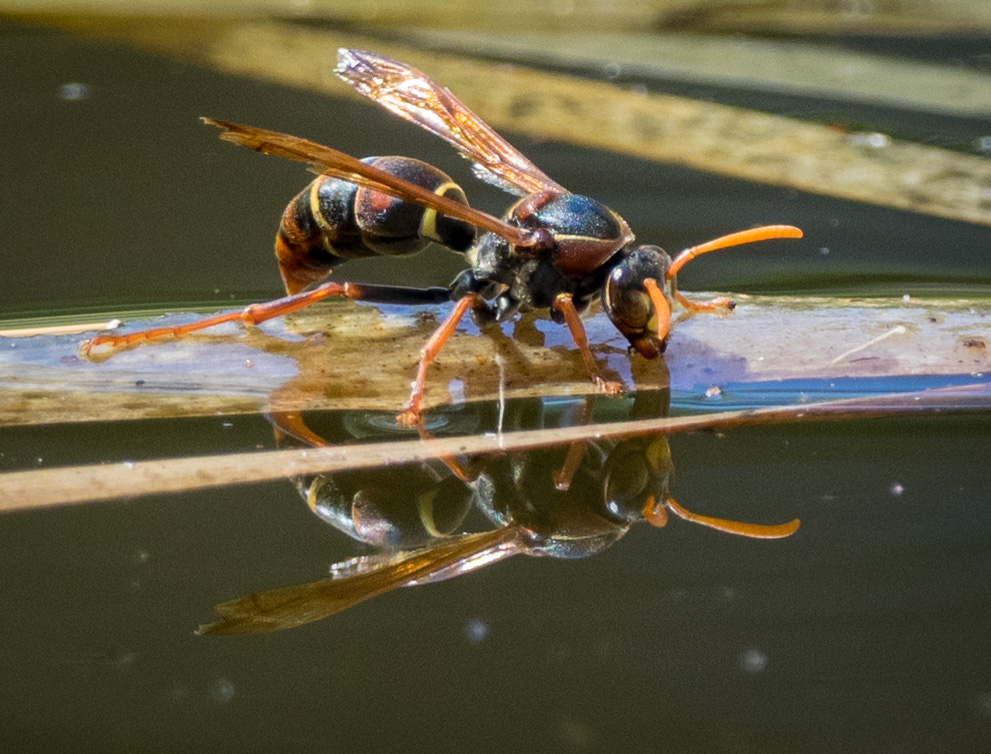
Table 1. Differences between European wasps and other Victorian wasp species
| European wasp Vespula germanica | European paper wasp Polistes dominula | Asian Paper wasp Polistes chinensis | Australian Paper Wasp Polistes humilis | |
|---|---|---|---|---|
| Abdomen colour | Yellow with black stripes | Yellow with black stripes | Black with yellow stripes | Orange-brown with faint yellow stripes |
| Body length | 12–16 mm | 13–2 mm | 13–25 mm | 10–15 mm |
| Antennae colour | Black | Yellow | Yellow | Yellow |
| Nest |
|
|
|
|
More information
- Department of Health – European wasp pest control page
- Better Health Victoria – European wasp
- iNaturalist – European paper wasp
- Atlas of Life Wasp Alert – Asian paper wasp
Photo credits
Figures 1 and 7: Joseph Berger, Bugwood
Figure 2: Agriculture Victoria
Figure 3: David Cappaert, Bugwood
Figures 4, 5 and 9: Kirri-Lee Harris, Atlas of Life
Figure 6: eWasp, CoreEnviro Solutions
Figure 8: iNaturalist
Reporting an unusual plant insect pest or disease
Report any unusual plant pest or disease immediately using our online reporting form or by calling the Exotic Plant Pest Hotline on 1800 084 881. Early reporting increases the chance of effective control and eradication.
Please take multiple good quality photos of the pests or damage to include in your report where possible, as this is essential for rapid pest and disease diagnosis and response.
Your report will be responded to by an experienced staff member, who may seek more information about the detection and explain next steps.
Report online